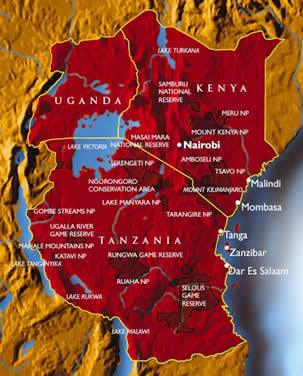
An opinion poll conducted by the Steadman group recently on the East African nations uniting and working together on matters related to trade and economic issues shows a good amount of support in where the poll was conducted. The respondents in the three countries of Kenya, Uganda and Tanzania, who were above age 18 and living mostly in rural areas, support the idea of closely working with other East African nations with Kenya being the most positive at 90%, 77% and 55% respectively.
The treaty for the establishment of the East African Community (EAC) was signed on November 30, 1999 after ratification by the original three member states of Kenya, Uganda and Tanzania. Both Rwanda and Burundi become members of the EAC after signing the treaty on June 18, 2007.
Among the questions put to the respondents was that which east African nation they would like to visit. Most Ugandans interviewed chose Kenya, the Tanzanians would like to visit Uganda and most Kenyan respondents wanted to visit Tanzania.
Another question was on how each of their countries would benefit from the regional integration. The majority Ugandan respondents mentioned large supply of goods in the market, Tanzanians most voted the economy getting better and in each of these countries, free movement of people from one country to another, probably being the last question, scored much less. Only 5% of Ugandans and 3% of Tanzanians endorsed it.
Border crossings in east Africa still require its citizens to obtain visas to travel to member states with goods charged very high premiums. With citizens willing and hoping to visit other member states, the EAC would do well to completely scrap visa restrictions and completely allow free movement of people and goods from one country to another. The report also greatly reflects the level of ignorance about the existence, benefits and how the EAC would improve people’s lives. The negative comments from Tanzanian respondents indicate this. They are afraid that the more educated east African neighbors will capture all the high paying jobs, competition from the more industrialized Kenyan market and economic growth not being distributed equally.
In conclusion therefore, with proper policies and legislation in place which is probably well laid out in the EAC treaty, the East African member states are bound to benefit more uniting than individually pursuing economic growth. Vigorous awareness campaigns in each member state should be a carried out to greatly inform and empower all the citizens on the benefits of the East African community.



